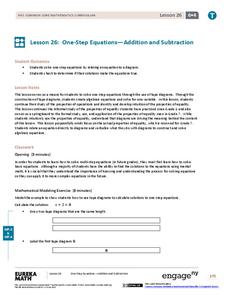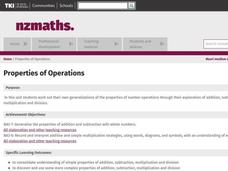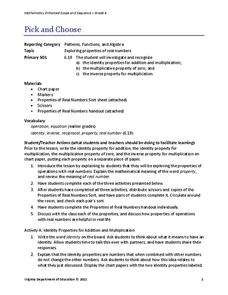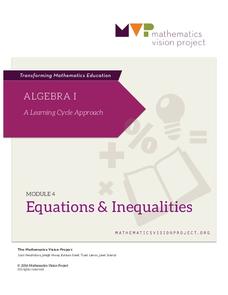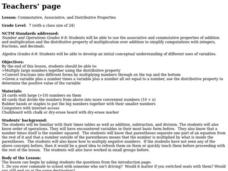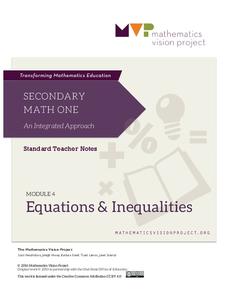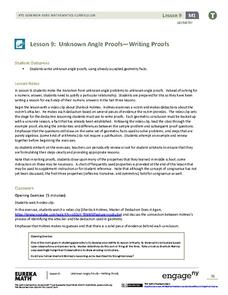Virginia Department of Education
Using Order of Operations and Exploring Properties
If you need some creative ways to teach the order of operations, use a series of activities that focus on properties. Each activity uses different materials and works as a stand-alone activity, or can build upon the concepts of the last...
EngageNY
One-Step Equations—Addition and Subtraction
Just one step is all you need to find success in solving equations. The 27th installment in a series of 36 teaches how to solve one-step equations involving addition and subtraction. Tape diagrams help future mathematicians in this task.
Curated OER
Properties of Logarithms
Students explore the concept of logarithms. In this logarithms lesson, students discuss the logarithm properties. Students use linear functions as a basis to develop the logarithm properites by substituting log b and log a for x and y.
Curated OER
Addition and Subtraction Pick n Mix 2
Fourth graders practice a wide range of strategies for solving addition and subtraction problems containing decimal fractions. They add and subtract fractions, decimals and integers while generalizing the properties of operations with...
Curated OER
Using Proof in Algebra
In this using proofs in algebra worksheet, 10th graders solve 2 proofs by applying the many rules from algebra for the Properties of Equality for real numbers. They name the property that justifies each statement as seen in the...
New Zealand Ministry of Education
Properties of Operations
Learners consolidate and extend understanding of simple properties of the four arithmetic operations. They use these properties as an aid to easy calculation. They discover and use some more complex properties of addition, subtraction,...
Virginia Department of Education
Pick and Choose
Properly teach properties with three activities that allow learners to investigate properties of real numbers. The resource covers the identity properties for addition and multiplication, the inverse property for multiplication, and the...
EngageNY
Replacing Letters with Numbers II
Teach about properties properly. Individuals investigate the commutative and identity properties for both addition and multiplication. They see that the properties hold true for all values by using substitution to test out several examples.
Mathematics Vision Project
Module 4: Equations and Inequalities
Can you justify that mathematically? Help learners see the process of solving as using mathematical properties rather than a set of steps to memorize in the fourth module of a nine-part Algebra I series. The module contains six lessons...
EngageNY
The Power of Algebra—Finding Primes
Banks are responsible for keeping our financial information safe. Mathematics is what allows them to do just that! Pupils learn the math behind the cryptography that banks rely on. Using polynomial identities, learners reproduce the...
Curated OER
Properties of Real Numbers
In this algebra instructional activity, learners identify and use the properties of real numbers to solve problems. They identify and differentiate between rational and irrational functions. There are 13 problems.
Curated OER
Integer Algebraic Addition
Learners use algebra tiles to solve linear equations with integer solutions. In this algebra lesson plan, students use the additive inverse and the zero pair concept.
Curated OER
The Distributive Property
Students solve problems using the distributive property. In this algebra lesson, students solve equations by multiplication and combining like terms. They graph their lines on the calculator.
Curated OER
Commutative, Associative, and Distributive Properties
Students explore the concept of the associative, commutative, and distributive properties. In the associative, commutative, and distributive properties lesson, students discuss real world examples of each property. Students demonstrate...
Curated OER
Properties of Real Numbers Reference Chart
In this algebra worksheet, high schoolers reference the six properties of real numbers over multiplication and addition in an easy to read format. There are 10 examples.
Curated OER
Area, Arithmetic and Algebra
Students model formulas for rectangles and squares. In this area, arithmetic and algebra lesson, students explore the formula for the area of squares and rectangles. They use squares to model the formula for the area and identify...
Curated OER
Identity and Equality Properties
In this identify and equality properties worksheet, 9th graders solve and complete 14 different problems. First, they solve each equation for the given variable. Then, students name the property or properties illustrated by each...
Utah Education Network (UEN)
Pattern Search
Pupils identify and define various mathematical properties, such as the commutative properties of addition and multiplication, and the associative property of addition. They also reason and communicate mathematically by making...
EngageNY
Adding and Subtracting Expressions with Radicals
I can multiply, so why can't I add these radicals? Mathematicians use the distributive property to explain addition of radical expressions. As they learn how to add radicals, they then apply that concept to find the perimeter of polygons.
Curated OER
Using Basic Properties to Solve Problems in Math
Learners identify and define the rules of properties of real numbers. They rewrite each of the problems listed using the commutative or associative properties. Pupils apply problem solving strategies to clarify situations in a table...
Curated OER
Properties of Real Numbers
In this Algebra II worksheet, students classify numbers by naming the subset or subsets of the real numbers to which it belongs. The two page worksheet provides explanation and examples in addition to ten practice problems. Solutions are...
Mathematics Vision Project
Equations and Inequalities
Help learners get their facts in line to build and solve complicated linear equations and inequalities. Pupils build upon their knowledge of solving basic equations and inequalities to solve more complex ones. Individuals work with...
EngageNY
Unknown Angle Proofs—Writing Proofs
What do Sherlock Holmes and geometry have in common? Why, it is a matter of deductive reasoning as the class learns how to justify each step of a problem. Pupils then present a known fact to ensure that their decision is correct.
Curated OER
Identity and Equality Properties: Pages 37-43
In this math worksheet, students use a list of mathematical properties in order to justify their evaluations. Students name multiplicative inverses and properties illustrated in 13 numbers and statements.



